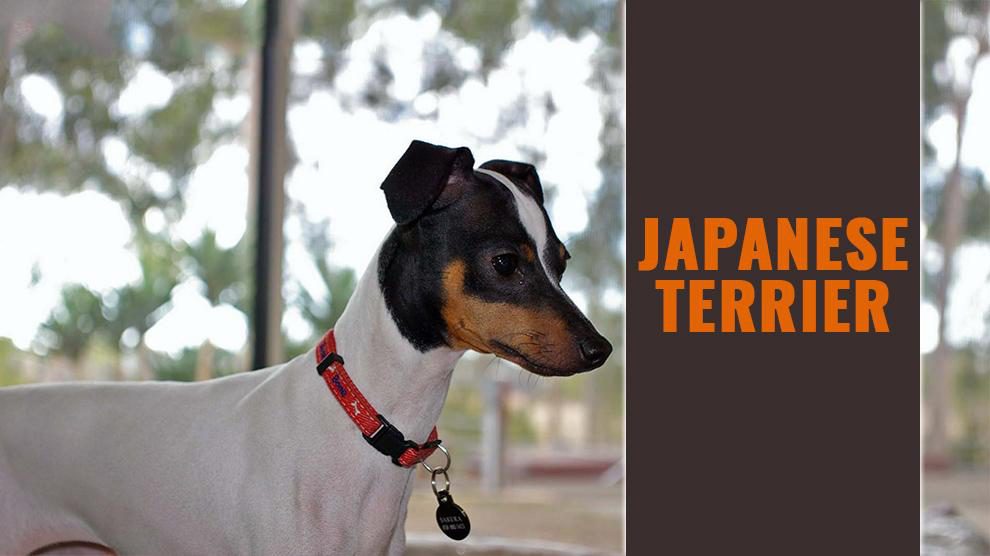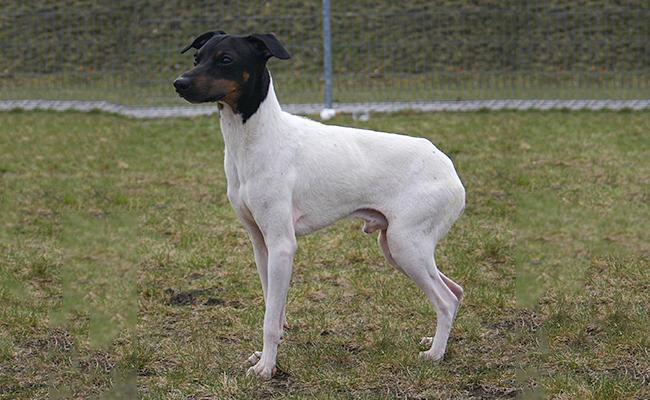Dog Pregnancy Calculator And Timeline
Popularly known as Oyuki Terrier, Mikado, Nihon, or Nippon, the Japanese Terrier is admired for its cheerful and lively character.
Mainly bred as a lap dog, this Japanese dog breed strives to be an affectionate and wonderful companion who loves being with his family.
The Japanese Terrier dog attaches itself to one person, and though loved for its enthusiastic character, this is a very rare dog breed to find.
The UKC recognized this breed in 2006.
Let’s dwell further about this rare breed, the Japanese Terrier.
Japanese Terrier Breed Characteristics Sheet
- Origin: Japan
- Size: Small
- Dog Breed Group: Terrier
- Purebred: Yes
- Lifespan: 12 to 15 years
- Height: 8-13 inches
- Weight: 5-9 lbs
- Coat Appearance: Smooth, shiny and silky
- Coat Colors: Tricolor, White, Black, and Tan
- Temperament: Friendly, affectionate, cheerful, loyal
- Good With Children: Yes
- Intelligence Level: High
- Good With Pets: Yes under supervision
- Hypoallergenic: Yes
- Grooming: Less
- Shedding: Low
- Barking: High
- Suitable For Apartments: Yes
- Need For Exercise: More
- Easy To Train: Yes
- Good For First Time Owners: Moderate
- Health Issues: Hip dysplasia, patellar luxation, entropion
- Litter Size: 4 to 7 puppies
- Average Price: $600
Japanese Terrier History And Origin
People believe that Japanese Terriers belong to the 16th century. A belief still exists that these terrier dogs were developed by mating Smooth Fox Terriers with the native Japanese dogs as hunter dogs initially.
These small terrier dogs were popular in the Nagasaki area. Later, the popularity spread all over Japan.
The Japanese Kennel Club recognized this breed in 1930. But, Japanese Terriers reduced drastically in numbers during World War II, almost went to extinction.
However, a few numbers of this breed existed post World War II. So, Japan still considers this breed as a rare one. If you can find this breed anywhere else in the world than Japan, you are lucky.
But, the United Kennel Club recognized this breed in 2006.
Japanese Terrier Breed Information
Japanese Terrier Appearance
Japanese terriers are small dogs but appear smart. These dog breeds have a flat but narrow head, V-shaped forward or folded ears, and a docked tail.
This terrier breed has a short but solid body, with a deep chest and strong back part.
Elegant, this animated dog overall looks like a well-balanced breed.
Japanese Terrier Coat
Japanese Terriers have a smooth, shiny and silky coat. He has a short coat of 2 mm length with dense, straight hair.
Japanese Terrier Colors
The coat of Japanese Terriers comes in tricolors namely white, black and tan.
The coat color can be a mix of the tricolors:
- Tricolor with a black, white and tan head
- Tan or black areas on the body
- White with black markings
In general, this breed has a white body with either black or tan head, black nose, and dark brown eyes of oval shape.
Japanese Terrier Size And Life Span
Japanese Terrier Size
Japanese Terriers are short in size. Both male and female dogs grow between 8 and 13 inches.
Like the height, these dogs weigh less. So, you can keep her in your lap. This dog weighs anywhere between 5 and 9 pounds.
Japanese Terrier Life Span
It is generally a healthy breed. So, he lives quite longer for 12 to 15 years.
Japanese Terrier Temperament
The small dog, Japanese Terrier, well suits your family because of his temperament.
Active and energetic – Japanese terriers are an active breed with full of energy. So, these dogs love to play games and also with balls, and toys.
Apartment-friendly – Due to his size, he can live in an apartment and enjoys playing and walking with the family members.
Child-friendly dog – Japanese Terrier is a cheerful breed and loves to play with children. But, these dogs are suitable for elder children than younger kinds due to his sensitive and emotional nature.
Companion dog – Happy, affectionate, loyal and spirited, Japanese Terrier is a wonderful family dog. He always wants to be the center of attention, loves people and wants to be loved by family members.
Lapdog – Japanese terriers were bred to become a lapdog. Thus, she enjoys if you hold her in your lap for a long time. She also expects you to cuddle her.
Good Watchdog – Intelligence, good sense and alertness make him a good watchdog. This terrier dog is able to hear small sounds and immediately alert his master about the strangers.
Japanese Terrier Training And Exercise
You can easily train Japanese Terrier as he is an intelligent, active and energetic breed. But, you have to keep in mind a few things while you provide him training or exercise.
- You have to provide consistent training for him.
- Providing trust and respect is the key to train these dogs successfully.
- If you train this breed with care, patience, and confidence, these dogs respond well to you.
- It is essential to provide crate training to him from his young age as he always likes to be the center of attention.
- Due to his possessive nature, you have to provide proper socialization training at an early age.
- Japanese terriers need daily exercise as he is an active dog. So, take him for a daily long walk and allow him to play for sometime daily.
- As he is an energetic dog, he loves to play with toys, games, etc. Thus, you can also provide training for agility trials.
- Outside home, ensure that this dog has a leash or he plays in an area covered by the fence because he may chase other animals.
- Japanese terriers are unable to bear worse climatic conditions (i.e. too hot or too cold climates). So, you should never take him outdoors during these climates.
Japanese Terrier Grooming And Maintenance
Japanese terriers are easy to maintain as this breed sheds minimally. Yet, you have to:
Brush his coat once or twice a week to minimize loose hairs. It is fine to use a soft bristle brush.
Check his ears regularly for bad smell or infection if any. You can wipe his ears using a cleansing solution or wet cloth.
Trim his nails carefully at least once a month. You can arrange for a professional groomer for nail clipping if you want. Grooming your dog provides him with an extra freshness which definitely has an effect on good health.
Bath him using dog shampoo when he is dirty. But, it is recommended to bath him every three months.
Check his teeth regularly for bacterial or tartar development. Brushing his teeth two or three times a week is recommended.
Japanese Terrier Foods
Foods for dogs always differ from humans. So, you should know what foods to give and what not to your pet before feeding him.
While feeding Japanese Terrier, ensure that you are feeding a well-balanced diet to him in order to prevent obesity.
Now, take a quick tour of the suitable and must avoid foods to feed your lovable Japanese Terrier.
Suitable Foods
Ensure that you are providing only 10 percent of the below foods to your Japanese Terrier.
- Raw food
- Home-made food
- High-quality dry dog food – you can mix this food with canned food, broth or water and feed him
- Vegetables
- Fruits
- Cooked egg
- Cottage cheese
Must avoid Foods
- Dry foods from commercial shops – fillers in these foods may not suit for Japanese Terriers.
- Low-quality dog foods – these dogs are prone to allergies. Low-quality foods won’t suit for this breed.
- Avoid salt or butter and other seasonings to the food.
- Avocado, green tomatoes, garlic, mushrooms, onions, and raw potatoes can also be unsafe
- Always keep chocolate, coffee and other foods containing caffeine away from your dog.
- Macadamia Nuts, almonds, Pistachio Nuts, and Walnuts will not be safe.
You should also know:
How Much to Feed and When?
In general, you should feed your dog based on his age, size, health concerns and the level of activity.
- If you are feeding high-quality dog food to him, 1 or one and a half cup is enough for him.
- Do not feed him a large meal. Feed him in portions (i.e. one meal in the morning and one in the evening).
- Provide him fresh water all through the day.
- You should feed 3 meals a day to 3- to 6-month-old Japanese terrier puppies.
- You should feed 4 meals a day to 8- to 12-month-old Japanese terrier puppies.
- For 6-month-old puppies to 1 year of age, you have to feed 2 meals per day.
- Adult Japanese terriers may require 2 meals per day. Thus, you have to feed him based on his tendency to eat foods.
Japanese Terrier Puppy Names
Finding a cute name for your tiny Japanese Terrier? Here’re a few.
| Male | Female |
|---|---|
| Boon | Apple |
| Clown | Bite |
| Dwarf | Choco |
| Fun | Drink |
| Jade | Judy |
| Ninja | Love |
| Peanut | Mochi |
| Rooney | Tulip |
| Sleek | Yummy |
| Vivid | Zuba |
Japanese Terrier Health Problems
Japanese Terrier is a healthy breed. But, he may get affected by certain health problems:
- Hip dysplasia – Degeneration of the hip joint
- Patellar luxation – The dislocation of kneecap from its position
- Eye problems – He may get cataracts, glaucoma, entropion, cherry eye, etc
- Ear infections – The middle section of the ear will get affected due to viral or bacterial infection. But, with antibiotics, this will be cured
Entropion is a common problem in Japanese terriers. Entropion is a condition in which the inward turn of eyelid leads to rubbing of eyelashes and skin against the eye surface. Also, these dogs may get ear infections during their old age.
Japanese Terrier Price And Breeders
Japanese Terrier Price
You can have a Japanese Terrier puppy at a cost of $600. But, you can adopt him from a local shelter by giving the price between $50 and $400.
Japanese Terrier Breeders
Japanese Terrier is a rare dog breed. So, it is quite difficult to find popular breeders in the United States.




















